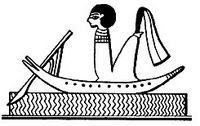Science panelist Sykes names favourite books
Her favourite films? Sykes responds, "I spent three years teaching in rural Zimbabwe, with little access to any screens; there were no televisions in the bush, and on forays to town, I rarely got to see films. This made me lousy at handling violence in film. It still shocks me, and I even avoid great films if necessary. I've loved everything I've seen by Stephen Poliakoff: his pace, and astute observations of the world and human beings."
Labels: Care of the Soul, The Soul's Religion, Thomas Moore


